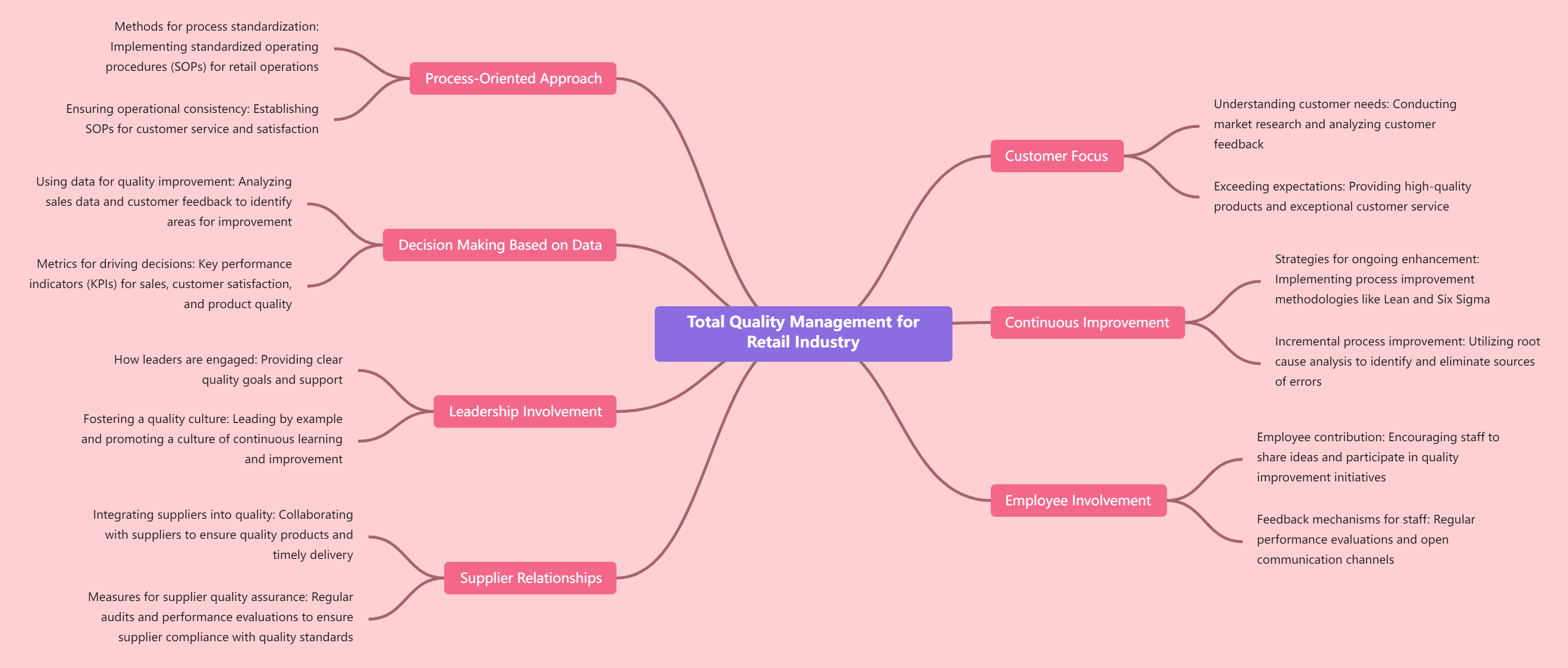
Description of the Mind Map Content
The mind map encompasses various facets crucial for the successful implementation of TQM in the retail sector. It starts by emphasizing a process-oriented approach, focusing on the establishment of Standard Operating Procedures (SOPs) to standardize retail operations. This includes SOPs for customer service, ensuring operational consistency throughout the retail environment.
Customer focus is another key element, advocating for a deep understanding of customer needs through market research and feedback analysis. The map suggests strategies for exceeding customer expectations by providing high-quality products and exceptional service.
Decision-making based on data is highlighted, showcasing the importance of utilizing sales data and customer feedback for continuous quality improvement. Key performance indicators (KPIs) for sales, customer satisfaction, and product quality are identified as crucial metrics for informed decision-making.
Continuous improvement is a recurring theme, introducing methodologies such as Lean and Six Sigma for ongoing enhancement. The map promotes incremental process improvement through root cause analysis to identify and eliminate sources of errors.
Leadership and employee involvement are emphasized as critical components of TQM. Leaders are expected to set clear quality goals, support the workforce, and foster a culture of continuous learning. Employee contributions are encouraged, with mechanisms for feedback and regular performance evaluations.
Supplier relationships are addressed as integral to TQM, advocating for collaboration with suppliers to ensure quality products and timely delivery. The map suggests measures for supplier quality assurance, including regular audits and performance evaluations.
Insights from the Mind Map
The mind map provides insights into creating a holistic TQM framework tailored to the retail industry. It underscores the importance of process standardization, customer-centric strategies, data-driven decision-making, continuous improvement methodologies, leadership and employee involvement, and strong supplier relationships. By following these principles, the retail industry can enhance operational efficiency, exceed customer expectations, and foster a culture of continuous quality improvement, ultimately leading to sustained success in a competitive market.
Creating Mind Maps with Visual Paradigm Smart Board
Visual Paradigm Smart Board stands out as a versatile online mind map app, offering an intuitive and collaborative platform for brainstorming and idea visualization. As a comprehensive mind map maker and tool, it seamlessly integrates into the workflow of businesses, providing a structured approach to Total Quality Management (TQM) for industries like retail. The online mind map software excels in facilitating the creation of intricate mind maps, such as the one described, by offering a range of features for process-oriented planning, data-driven decision-making, and continuous improvement strategies. Its capabilities extend beyond being a mere brainstorming tool; it serves as a dynamic space where teams can collaboratively ideate, strategize, and refine concepts. Visual Paradigm Smart Board emerges as an invaluable resource for organizations seeking an efficient and collaborative online solution for their brainstorming and mind mapping needs.